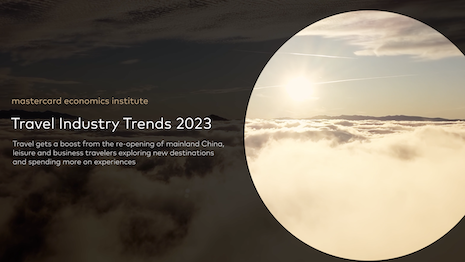 In the first full year of unfettered travel since the pandemic, consumers are acting on pent-up desire to explore new locales, connect with friends and family and accumulate experiences to make up for lost time, according to findings from a new Mastercard Economics Institute study. Image credit: Mastercard Economics Institute
In the first full year of unfettered travel since the pandemic, consumers are acting on pent-up desire to explore new locales, connect with friends and family and accumulate experiences to make up for lost time, according to findings from a new Mastercard Economics Institute study. Image credit: Mastercard Economics Institute
Consumers are taking advantage of a more traditional travel ecosystem in 2023, prioritizing leisure travel and pioneering new corridors around the world.
In a new report, the Mastercard Economics Institute’s Travel Industry Trends 2023 delivered key insights about the global state of travel, punctuated by shifting economic landscapes, persistent consumer demands and a reopening of mainland China.
“In the face of a changing economic landscape, post-pandemic preferences for experiences over things and a consistent demand for leisure travel shape the 2023 outlook,” Mastercard said in a statement.
“Initially lagging leisure travel, business travel found its footing in the latter half of 2022, especially in cultures prioritizing a return to office,” the payment processor said.
“With an uncertain economy providing some cross-market turbulence, mainland China’s reopening is expected to bolster growth globally with concentrated impact in Asia Pacific, according to Mastercard Economics Institute estimates.”
Per the Mastercard Economics Institute’s findings:
Leisure and business travel are growing at the same pace. Global leisure travel remains strong, with flight bookings up roughly 31 percent in March 2023 compared to the same month in 2019.
In the second half of 2022 into early 2023, corporate flight bookings caught up to leisure flight bookings, driven by regions with a strong return-to-office culture.
Global leisure and business travel are now growing at similar rates.
“Our insights show demand for in-person meetings, with the most significant growth in commercial travel and entertainment expenses being led by Asia Pacific and Europe up 64 percent and 42 percent, respectively, between January-March 2023,” Mastercard said.
Mainland China’s reopening benefits global and Asia Pacific tourism. China’s reopening following tight COVID-119 regulations comes at a time when it will likely have a positive impact on the experience economy as pent-up demand for travel is expected to drive strong tailwinds, Mastercard said.
By March 2023, spending on experiences was notably 93 percent of where it was in 2019 despite minimal travel last year.
Economies in the Asia-Pacific region could be obvious beneficiaries of China's opening, given their strong ties to international trade, tourism and geographical proximity.
Based on Mastercard Economics Institute estimates, other countries that are expected to benefit include northern Europe – Germany and France – and Brazil, which could see a boost in their exports to China as the economy recovers.
Travelers establish new corridors. As consumers are enjoying higher incomes and returning to some level of pre-pandemic comfort, they are also starting to venture further from home to new locations.
Germany and Spain are becoming more popular for Latin American travelers, while Saudi Arabia and Egypt have become popular destinations for travelers from Eastern Europe, Middle East and Africa.
The United States, previously ranked as No. 5 in the top destinations for European travelers in 2022, now ranks No. 4, signaling a building desire to explore across the pond.
Traditionally tourism-driven European countries such as France, Italy, Spain, Portugal and Greece could disproportionately benefit from resilient global tourists.
Tourists continue to prioritize experiences. Preference for experiences over things persists, and travelers are demonstrating new demand for the unique, Mastercard found.
Potentially influenced by social media and entertainment, travelers are landing in lesser-known destinations in search of cultural immersion.
As of March 2023, global spending on experiences was up 65 percent, while spending on things is up 12 percent compared to 2019.
Experience-oriented spending is surging in certain corridors where pandemic lockdowns have expired, but Chinese tourists who traditionally over-index on luxury retail compared to other tourists could provide a boost to goods spending across markets, according to Mastercard.
“In the first full year of unfettered travel since the pandemic, consumers are acting on pent-up desire to explore new locales, connect with friends and family, and accumulate experiences to make up for lost time,” said Bricklin Dwyer, Mastercard chief economist and head of the Mastercard Economics Institute, in a statement.
”Despite evolving economic landscapes, resilient consumers continue to prioritize travel,” he said. “And with new corridors emerging and China reopening, the 2023 outlook indicates good reason to be optimistic.”